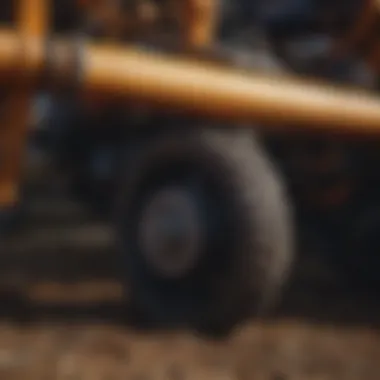How to Find Local Used Implement Dealers


Intro
Finding a good used implement dealer is essential for anyone involved in agriculture or horticulture. With the market for used equipment expanding, understanding how to locate dealers in your area becomes crucial. The right equipment can greatly enhance productivity and efficiency. This guide aims to assist readers in navigating the search for used implement dealers.
Current Trends in Agriculture and Horticulture
Overview of Recent Innovations
In recent years, agriculture has undergone significant changes. Modern technology integration is altering how farming is conducted. Tools like GPS and precision farming software are becoming common. These innovations help farmers make data-driven decisions.
Buying used implements can provide access to technologies that may otherwise be out of financial reach.
Sustainable Practices Gaining Popularity
Sustainability is reshaping the agricultural landscape. Many farmers are adopting practices that focus on preserving resources. This includes techniques such as no-till farming and organic pest management. Used equipment can play a role here. It allows farmers to maintain sustainable practices with a lower upfront investment.
Importance of Finding Local Dealers
Location matters when searching for used implement dealers. Proximity ensures quicker access to equipment and parts. Local dealers also understand regional farming needs. This can lead to more relevant advice and better service.
"Finding a dealer who knows your local conditions can save time and enhance productivity."
Finding local dealers can also support the community, allowing customers to develop lasting relationships and service agreements.
Evaluating Equipment Quality
When purchasing used implements, quality evaluation is vital. Inspecting the equipment for signs of wear or damage can prevent future expenses. Look for:
- Consistent maintenance records
- Signs of rust or corrosion
- Operational tests before purchase
A reputable dealer will provide transparent information about the history of their equipment.
Online Resources and Local Directories
Utilizing technology can simplify the search for used implement dealers. Websites and platforms like Craigslist and Facebook Marketplace can yield potential leads. Additionally, local agricultural extension offices may provide directories for functional dealers in your area. Sites like Wikipedia and Britannica can help you find background information about preferred tools and technologies.
The End
Actively finding used implement dealers requires diligence and informed decisions. Understanding market trends and evaluating equipment quality can lead to successful acquisitions. Utilizing both local resources and online platforms ensures you can locate dealers who meet your needs. This comprehensive approach will serve the agricultural community well, facilitating better decisions in purchasing used implements.
Understanding Used Implements
Understanding used implements be essential for anyone involved in agriculture or gardening. Purchasing used implements can save significant costs while providing high-quality equipment. The second-hand market for farming gear has grown, meaning there are more options than before. This section of the article examines various facets of used implements, including their definition and types available on the market. Consideration of these factors helps ensure a smart purchasing decision.
Definition of Used Implements
Used implements refer to agricultural equipment that has been previously owned and is now available for resale. This can include machinery like tractors, plows, seeders, and tillers. Each piece may have varied degrees of wear and tear, depending on its age and usage. Understanding this definition creates a foundation for recognizing both the opportunities and risks associated with buying used equipment. Buyers must assess the implements’ condition and functionality before making a purchase.
Types of Used Implements Available
When looking for used implements, it is crucial to be familiar with various types on offer. Each type serves a distinct purpose in agriculture, aiding in different tasks.
Tractors
Tractors are the backbone of modern agriculture. They provide power for various tasks, including tilling, plowing, and hauling. Their versatility is one of the key characteristics that make them a popular choice. The ability to attach different implements allows farmers to adapt to specific needs on the field. One major advantage of buying used tractors is their cost efficiency; they are generally more affordable than new models, which is significant for any farmer. However, older models may lack some of the advanced features found in newer offerings.


Plows
Plows are essential for primary tillage. Their primary role is to turn over the top layer of soil, preparing it for planting. An essential characteristic of plows is their ability to break up soil compaction. This helps promote better soil aeration and moisture management. Used plows can provide excellent value, especially when they are well-maintained. A drawback may be mechanical issues that arise in older models, making it critical to inspect them carefully before purchase.
Seeders
Seeders are crucial for planting seeds efficiently and uniformly. The technology behind seeders has developed significantly, but many older models remain effective. A key characteristic of seeders is their precision in placing seeds at specific depths and spacing. Used seeders can also represent a cost-effective solution, enabling farmers to access quality equipment at a more manageable price. One consideration is that older seeders may not include modern features that enhance user-friendliness.
Tillers
Tillers aid in soil preparation, making it easier for seeds to germinate and grow. Their role in breaking up soil and mixing in organic matter is vital. A significant benefit of used tillers is their ability to operate in various soil types. They also tend to be less expensive compared to more complex equipment. However, buyers should keep in mind that the durability and effectiveness of the tiller may vary based on previous usage.
Purchasing used implements encompass many factors to consider, moving beyond just finding a good price. Understanding what types are available and their specifications can empower buyers to make informed decisions.
Advantages of Purchasing Used Implements
Purchasing used implements offers distinct advantages that are critical for any agricultural operation. Recognizing these benefits can assist individuals in making informed decisions. Whether you are a seasoned farmer or a gardening enthusiast, understanding these advantages can guide your search for equipment that meets your needs and fits your budget.
Cost Efficiency
One of the primary advantages of buying used implements is cost efficiency. The financial implications of acquiring equipment can be significant, especially for small-scale operations. Used implements generally come at a much lower price point compared to new ones.
For instance, a used tractor can be several thousand dollars cheaper than the latest model. This price gap can be an incentive for farmers who need reliable equipment without incurring large debts. Additional savings can come from minimal depreciation. New equipment depreciates rapidly in the first few years, while used implements have already gone through this phase.
This means that buyers of used equipment may not face the same steep loss in value as those purchasing new. Moreover, reduced initial investment allows for the allocation of funds to other essential areas, such as maintenance, seeds, or labor. Buyers can also consider upgrading or enhancing used implements with aftermarket parts, further extending their lifespan without the high upfront cost of brand-new machinery.
Access to Older Models
Another notable advantage of purchasing used implements is the access to older models. Depending on individual requirements, some farmers and enthusiasts may find that older equipment meets their needs more effectively than newer models. Advanced technology may not be necessary for every agricultural task. Older implements often showcase a simplicity that can be beneficial to those who prioritize ease of use and maintenance.
Moreover, certain older models may have features that are no longer available in recent versions. These features could better align with specific farming practices or personal preferences. For example, a vintage planter designed for a specific type of crop may not have a modern equivalent. In addition, procuring older models can also enrich one’s farming experience by connecting with the history and evolution of agricultural implements.
Factors to Consider When Buying Used Implements
Understanding the factors when buying used implements is essential for making informed purchases. This ensures that the equipment you acquire meets your needs and performs efficiently. When evaluating used implements, consider the equipment's condition, the dealer's reputation, and the warranty and return policy.
Condition of the Equipment
Visual Inspection
The visual inspection is a critical step in evaluating used implements. It involves a thorough examination of the equipment's exterior. Look for signs of wear, rust, or damage. A well-maintained surface often indicates better overall care. Checking for loose or missing parts can also reveal neglect or lack of maintenance.
The key characteristic of visual inspection is its simplicity. It requires no special tools, making it accessible to many buyers. However, this method has its limitations. While visual observations can indicate potential problems, they do not guarantee the equipment's full functionality. Thus, it should not be the sole method of evaluation.
Operational Testing
Operational testing provides insight into how the implement performs in real-world conditions. This approach involves operating the equipment to check for mechanical issues. Pay attention to sounds, vibrations, and responsiveness during operation. This can reveal underlying technical problems that may not be visible.
The benefit of operational testing is substantial. It allows you to experience the equipment firsthand. Unique to this method is the ability to assess performance under load, which visual inspection cannot offer. However, not all dealers may allow you to conduct such tests. This can limit your ability to fully assess the equipment before purchase.
Dealer Reputation
Online Reviews
Online reviews serve as a valuable resource when selecting a dealer. They provide unfiltered feedback from previous customers. These insights can greatly influence your purchasing decision. Assessing reviews helps you identify trustworthy dealers and avoid potential pitfalls.


The main characteristic of online reviews is their accessibility. They are available on various platforms, making it easy to find information about different dealers. However, reviews can be biased. Consider the volume of reviews and overall trends rather than individual opinions.
Customer Testimonials
Customer testimonials offer a more personal perspective on a dealer’s service. They often include detailed experiences from previous buyers. These testimonies can highlight the strengths and weaknesses of a dealer, shaping your expectations.
The unique feature of testimonials is their specificity. They can provide insights into the dealer's integrity, customer service, and follow-up. However, testimonials can sometimes be overly positive or negative. Hence, it’s important to look for patterns in the feedback and cross-reference with online reviews for a balanced viewpoint.
Warranty and Return Policy
A dealer’s warranty and return policy are paramount in buying used implements. A good warranty offers peace of mind and protection against unforeseen defects. It indicates the dealer's confidence in their products. Similarly, a fair return policy can save you from regret if the equipment doesn't meet your needs.
When evaluating these policies, consider the duration of the warranty and specific coverage details. Ensure you understand what is covered and any exclusions. Not all dealers provide the same level of protection, so it is advisable to be thorough in your investigation.
How to Find Used Implement Dealers Near You
Finding used implement dealers is critical for both farmers and gardening enthusiasts. Having access to a reliable dealer can save time and money while providing opportunities to explore different types of equipment. The process involves using various resources efficiently to connect with dealers who offer used implements that fit specific needs.
Online Search Strategies
Search Engines
Search engines like Google or Bing serve as primary tools for discovering used implement dealers. Their ability to generate relevant search results based on keywords makes them advantageous. Simply inputting terms like "used implement dealers near me" returns a variety of potential locations and online options.
The primary characteristic of search engines is their speed. Users often find specific dealers within minutes, allowing for quick comparison of prices and services. This convenience is valuable for those who are busy or have urgent needs. However, one downside is the overwhelming amounts of information, which can lead to confusion and difficulty in discerning reputable sources.
Social Media Platforms
Social media platforms, such as Facebook and Reddit, play a growing role in connecting buyers with sellers of used implements. Many local dealers maintain active profiles to reach potential customers. By engaging with community groups focused on agriculture, users can discover recommendations and firsthand reviews.
The strength of social media lies in its interactive nature. Users can ask questions and receive immediate feedback from fellow enthusiasts. Yet, the informal setting can also result in unreliable information if not approached critically.
Local Directories and Classifieds
Yellow Pages
Yellow Pages remain a traditional yet effective means to locate used implement dealers. This directory lists businesses by category and geographical location. Users can quickly find contact information and address details for dealers nearby.
A key feature of Yellow Pages is its structured format. This organization allows users to navigate quickly through listings. However, as many dealers now rely on online platforms, Yellow Pages may not showcase all available options, limiting user exposure to potentially better deals.
Craigslist
Craigslist is another valuable resource for finding used implement dealers. It offers classified ads that include listings from private sellers as well as dealers. This variety allows potential buyers to explore broader options.
The unique aspect of Craigslist is the ability to directly communicate with sellers. This feature fosters negotiation, which can be beneficial for achieving better pricing. Nevertheless, users must exercise caution due to the potential for scams or misrepresented products. It's essential to perform due diligence before making any transaction.
Utilizing Industry Networks
When it comes to finding used implement dealers, tapping into industry networks is a prudent strategy. These networks are often rich in information and can provide valuable connections. They allow you to meet others who share similar interests in agricultural equipment. Leveraging these networks can lead you toward reliable dealers and quality products.
Join Local Agricultural Associations
Becoming a member of local agricultural associations can be extremely beneficial. These organizations often have a vast network of dealers and vendors. They organize meetings, events, and seminars where members can exchange information about where to find the best used implements.
Benefits of joining include:


- Access to exclusive dealer listings
- Knowledge about local market trends
- Opportunities for networking with seasoned farmers
Membership typically involves a small fee but can yield substantial returns in terms of equipment deals. You might also find educational resources that help you understand what to look for in used equipment.
Engage with Fellow Farmers
Engaging with your peers in the agricultural community can unveil hidden opportunities. Fellow farmers often have firsthand experiences with dealers in your area. Their insights can help identify trustworthy dealers and steer you away from unreliable ones.
Consider these benefits:
- Sharing of personal experiences with specific dealers
- Recommendations on best practices for equipment purchasing
- Opportunities for group purchases which can lower costs
Creating relationships with local farmers can extend your network significantly. They often are more willing to share information than larger organizations. You may also discover resources through casual conversations that may not be widely advertised.
Finding a reliable used implement dealer can often hinge on the strength of your network. Don't underestimate the power of local connections in your search.
Evaluating the Purchase
Evaluating the purchase of used implements is an essential step in ensuring a savvy investment decision. This phase focuses on understanding the value of the equipment while aligning it with your specific needs. Learning to evaluate effectively allows you to make a choice that not just seems right at the moment but proves beneficial over time. The process includes various important elements such as negotiating the price and exploring financing options.
Negotiating Price
Negotiating the price is a crucial part of buying used implements. It is not simply about getting the lowest price; it is about ensuring that you are paying a fair amount for the value received. Begin your negotiation by conducting thorough research. Know the market value of similar implements by researching online or consulting with peers. This knowledge gives you a strong foundation.
When discussing the price with the dealer, express any discrepancies regarding the condition or functionality of the equipment. Pointing out these issues can justify your offer, especially if the equipment shows wear and tear or has not been maintained properly. Remember, being respectful and clear in communication often leads to better negotiation outcomes.
Focus on your budget limits while negotiating and be prepared to walk away if the price does not match your expectation. You can always seek other options.
Financing Options
Understanding financing options is part of a well-rounded evaluation process. Not all buyers have the cash readily available for a significant purchase. Therefore, knowing the financing options available helps you make an informed decision without straining your finances.
Many used implement dealers offer financing plans tailored to meet your financial needs. These plans often have varying interest rates and terms. It’s beneficial to shop around for the best possible terms. Some key points to consider include:
- Interest Rates: Compare rates from different dealers and financial institutions. Lower interest rates save you money in the long run.
- Payment Terms: Examine the length of the loan term. Longer terms mean smaller monthly payments but could result in more interest paid overall.
- Down Payment: Some lenders may require a substantial down payment. Factor this into your budgeting.
Examine all documents carefully before signing. Ensure you fully understand the implications of each aspect of your financing agreement. The wrong choice can result in financial burdens that outweigh the benefits of purchasing the implement.
Ultimately, the evaluation process may require time and patience, but the effort will lead to a more satisfying purchase and a solid investment in your agricultural activities.
After the Purchase
Once a purchase has been made, the journey does not end. Understanding what steps to take after securing a used implement is essential for its longevity and effectiveness. Proper follow-up actions enhance the investment made, ensuring that the equipment serves efficiently over time.
Maintenance is among the most critical aspects post-purchase. Regular upkeep not only extends the life of the equipment but also prevents unexpected malfunctions that can lead to costly repairs. Additionally, monitoring performance helps manage the implement’s functionality, allowing users to make informed decisions regarding its use and any potential need for replacement or upgrades.
"A well-maintained implement can make a significant difference in efficiency and productivity on the farm."
Maintenance Tips
Caring for used implements requires an organized approach. Here are key maintenance tips:
- Regular Inspections: Visual checks should be routine. Look for any signs of wear, rust, or damage. This practice helps in identifying issues before they escalate.
- Cleaning: After each use, clean the equipment thoroughly. Dirt and debris can cause wear if not handled properly. Make sure to remove any buildup, especially after working in wet or muddy conditions.
- Lubrication: Moving parts need lubrication to function smoothly. Follow the manufacturer’s instructions for specific lubricants and frequency.
- Calibration: For specific implements, ensure they are calibrated correctly. This is crucial for implements like seeders and tillers that rely on precision.
- Storage: When not in use, store the equipment in a dry, sheltered location. This protects it from the elements that may lead to rust or deterioration.
- Replacement Parts: Keep an eye on parts that are prone to wear. Having spare parts on hand can reduce downtime during critical periods.
Tracking Equipment Performance
Evaluating how well the equipment performs can provide insight into both the efficiency of the implement and the effectiveness of maintenance practices.
- Operational Hours: Keep track of how many hours the implement is in use. This data helps in determining maintenance schedules.
- Performance Metrics: Evaluate productivity based on the output achieved. This could be acres planted for tractors or the pounds of produce processed for tillers.
- Downtime Analysis: Record instances of downtime. Understanding the reasons behind each instance can help in making necessary adjustments in maintenance routines.
- User Feedback: Collect and analyze feedback from anyone who's using the implement. Insight from multiple users can reveal issues that may not be immediately apparent.
- Documentation: Maintain a log of all maintenance performed and any problems encountered. This can serve as a valuable resource for future reference or when selling the implement.
By following these steps, farmers and enthusiasts can ensure that their used implements remain productive and reliable for years to come, leading to better overall performance in their agricultural tasks.



